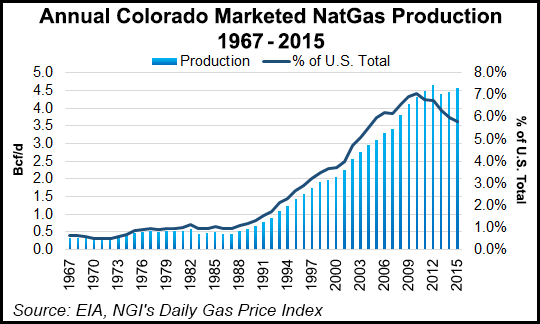Regulatory | NGI All News Access
Colorado Bill Threatens Oil, NatGas Operators, Industry Says
The Colorado House passed HB 1310 to the state senate last week, causing continued concern among officials at the Colorado Oil and Gas Association (COGA) and across the industry.

HB 1310 narrowly passed out of committee earlier this month, causing concerns by the state’s two main industry trade associations, which fear a chilling impact on oil and natural gas activities, including hydraulic fracturing (see Daily GPI, March 15). Those concerns were magnified when the measure was passed by the lower house last week and sent on to the state senate, though one knowledgeable capitol watcher told NGI it has little chance of passage.
“The bill ignores 70 years of legal precedent as applied to the liability of oil/gas companies in Colorado and actually treats oil and gas as if it’s hazardous waste rather than products that Coloradans rely on every single day,” said COGA spokesman Doug Flanders. HB 1310 would “radically change” state law and legal standards, he said.
“We’re very disappointed that it passed out of the full House despite opposition from a broad and diverse coalition of business leaders and organizations.”
The measure’s own language indicates that if were to be signed into law it “would hold oil and gas operators strictly liable for their conduct if oil/gas operations, including a hydraulic fracturing treatment or reinjection operations cause an earthquake.” Plaintiffs would be given five years after discovery of alleged damages or injury to file a legal action.
Any quake damage to the surface owner’s property could conceivably be found to be the liability of the oil/gas operators working in the area. The legislation makes it easier for the landowners to sue, and to allege oil and gas operations have harmed their land, structures on the land or any persons on their land.
The lawmakers’ action ignores Gov. John Hickenlooper’s last five years, during which he has turned the state into “a model for other states and countries, Flanders said.
“By far, Colorado already has the most rigorous oil/gas regulations in the nation protecting our environment, our citizens and their private property.” COGA has urged that the legislature let the state’s new rules work, rather than “consistently changing the rules for political purposes.”
© 2024 Natural Gas Intelligence. All rights reserved.
ISSN © 1532-1231 | ISSN © 2577-9877 |
